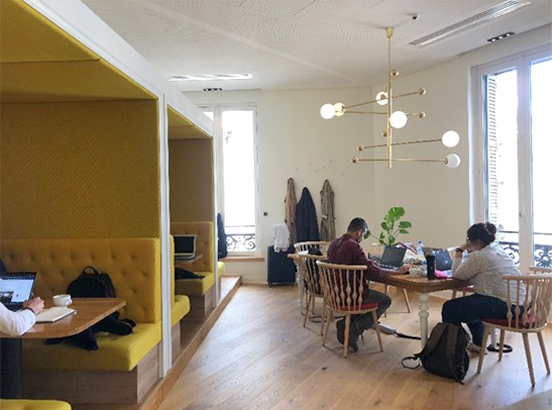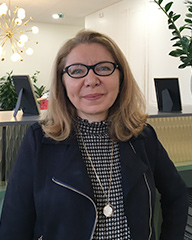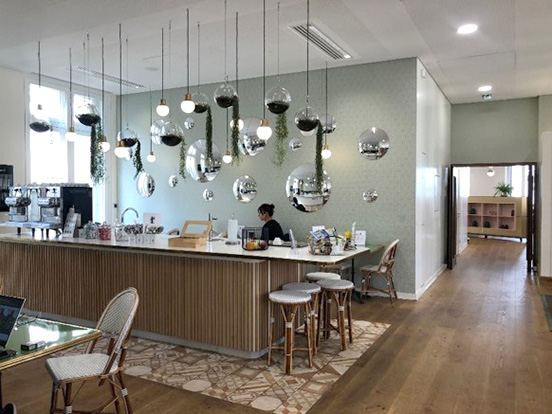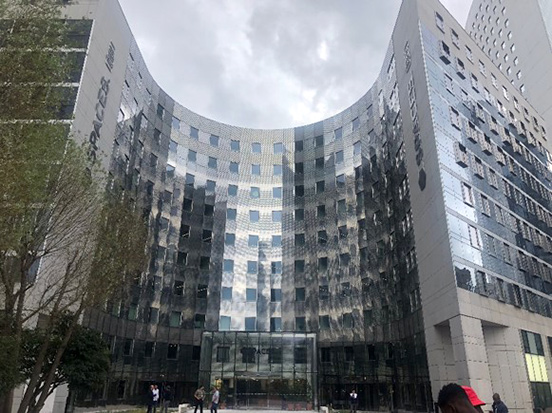[Workstyle Reforms in France (4)] The Future Vision of Flexible Work by the Largest Workspace Operator
IWG France
Of western countries, France has one of the largest numbers of office workers who commute by train. People who moved to the suburbs from Paris, where land prices have continued to rise in recent years, are having to commute longer, with the resulting increase in commuting stress becoming a social problem. Telework has been one way to solve this issue, and the government has been taking the initiative in supporting telework especially since the revision of the labor law in 2017.

Under such an environment, which has a lot in common with Japan, the efforts of France to reform workstyles and the workplace should be inspiring to Japanese companies. In this series we will introduce interviews with some of the players in the industry.
65% of self-employed workers fear being alone
IWG (International Workplace Group; former Regus) is the world's largest workspace provider that currently operates over 3,400 workspaces in over 1,100 cities across more than 110 countries around the world. They operate workspace brands such as Regus, SPACES, HQ, Signature, No18, and Stop & Work (in France only), all with different characteristics.
In 1989 when Regus (the first brand of IWG) opened its first business center in Brussels, Belgium, today's technology did not exist, but the founder, Mark Dixon, already realized that creating a network of workers would be their biggest business appeal.
"As an experienced entrepreneur, our founder knew that the future of work would be in sharing: space, problems, ideas, and in generating business together. He realized very quickly that the business centers aren't just a cost effective workspace solution but catalyzers for the business of the companies." (Vilidiana Abou, Head of Marketing & Communications, IWG France)

Since the global crisis in 2008, nomad workers, freelancers, self-employed persons, and entrepreneurs have started to use flexible offices more. According to IWG's survey of such people working in new ways, 65% replied that they feared being by themselves without having any support. When they work in the spaces of business centers or a co-working area instead of working alone in their home, they can exchange any kind of information with other workers, from administrative topics to taxes and rumors in the industry. New businesses and ecosystems have actually been created from such communications.
The first business centers of the Group opened in London, Paris and Brussels, and then expanded its business to regions outside Europe and from metropolis centers to secondary cities. IWG's strength is that it has the world's largest network of flexible spaces. Since this network has spread not only in office areas of urban centers but also to a wide range of locations and buildings such as airports, railway stations, public facilities, and shopping malls , their spaces cater to the needs of wide variety of clients of various company sizes and industry. IWG's unique membership plan offers a huge advantage to today's workers, who travel frequently, by allowing members to use all of IWG's workspaces across the world.
Each workspace brand has different characteristics
New ways of working have developed with the advance of new technology, and workplace demand has changed accordingly. In order to be more sensitive to such developments, IWG operates several brands with different characteristics. For example, Regus, the historical brand of the group, places the greatest importance on having good location, to have offices that can flexibly adapt to every size of company. Each center is 1000-2000 square meters, and companies and self-employed workers can sign up for their own dedicated section. Every center offers ready-to-go offices but also a co-working area, a reception, a kitchen and cafe area, which allows users to use the space as a business lounge.
SPACES offers creative workspaces with an entrepreneurial spirit. They have elaborate interior design, events in collaboration with the community, a fitness rooms, cafeterias or restaurants. The surface range from 3,000 square meters to 18,000. There are currently 300 SPACES. Locations around the world, and a further 150 are scheduled to open in the future.

Meanwhile, Signature, which is small but more exclusive, is located in excellent addresses such as Place Vendôme and Rue du faubourg Saint-Honoré in Paris. No18, which is IWG's latest brand that is scheduled to open soon, is expected to be like a private club with top-class design in a luxurious setting like a 5-star hotel.
In France, IWG operates 130 spaces in total (of which, 80 are under the Regus brand, 10 are under the SPACES brand, 20 under HQ and 10 Stop and Work). Users can be categorized into the following three groups: large companies, SMEs and startups, and self-employed persons and freelancers. IWG thinks this is the best mix.
IWG continues to invest aggressively amid talks that the flex space market in France has become saturated. For example, in March 2019 it opened Paris' largest SPACES in La Defense, a major business district in Europe located in the West suburb of Paris. It is the world's largest co-working space with a size of 18,000 square meters, 1,575 desks, and 10 meeting rooms.
Users' circumstances vary. For example, an IT company may use the space when launching a fixed-term project team of 40, 50, or 100 people, or a global firm may use it as a marketing center when expanding into Paris. Or a large French company based in the suburbs of Paris or in the regions may use the space to attract young talent. Another large company uses spaces around the world as a touchdown base when their salespersons visit clients in the country or when going on a business trip abroad. The greatest advantage for companies to use these spaces is the ability to flexibly expand or reduce the size of the space as needed and improve cost efficiency.
"Our major challenge when opening SPACES La Defense was to bring the companies from the new economy, such as IT companies, and the Millennials to La Defense, which is the headquarter for large corporations and companies from the CAC 40 "(Vilidiana Abou)

Residents of Paris do not like to cross the ring, or the periphérique, to go to work. La Defense, in particular, has a strong image of consisting of a cluster of skyscrapers, and was considered to be out of fashion by today's workers who prefer collaboration. That is the very reason why there was meaning to provide a new perspective in the place. For the last several years, IWG have been holding many events in La Defense that are attractive to the Millennials to highlight the appeal of SPACES as well as to change the image of La Defense.
Stop & Work located in the suburbs contributes to the local economy
There are other workspaces that IWG operates in the suburbs. Stop & Work is a French brand that started in 2014 and currently has 10 locations. The characteristic is that all of them are located in the suburbs of Paris. Users of a space located in Versailles in the suburbs of Paris are residents living nearby and parents who have children going to schools nearby, with 70% of them being individual customers such as freelancers and self-employed persons. Office workers also use the space for staggered work hours. Since these spaces contribute to the local economy, mayors of regional cities are increasingly trying to attract workspaces to their community. With such spaces opening in the community, the city earns taxes and people living in the suburbs can do their work without having to go all the way to Paris.
Very often, municipalities near Paris have not been able to effectively use the sites and buildings they have for libraries, cinemas, and conference centers for associations. Creating workspaces in these places revitalizes the municipality by generating new energy and establishing a local community. Stop & Work spaces are often full after two or three months from opening. For example, the space in Massy, which is in the southern suburb of Paris, was 50% occupied on the day of the opening, but today the occupancy is about 95%. IWG's strategy is to continue operating many spaces in the suburbs, people's residential areas.
Changes in workstyles: The spread of telework in Paris

The spread of telework in France was due to several historical, political, and social factors. First of all, the tertiary industry saw rapid growth in the 1990s, which led to digitalization of labor from a very early stage based on government policy. Furthermore, discussions on telework became active since the financial crisis of 2008 as companies moved their buildings from the cities to the suburbs to reduce costs, which frustrated the employees who had to commute longer. Telework was introduced on a full scale by 2009, when the flu (SARS) spread across the nation, triggering the government to allow working from home first for a limited period as an emergency measure. By 2012, clauses related to telework were added to the labor law, which presented a new way of working using digital technology.
The decisive move was in 2017 when the labor law revised under the Macron administration deemed telework as a right of workers and required employers to justify the reason when rejecting applications for telework. As in other countries, France saw a surge in land prices in the cities, which resulted in people moving out to the suburbs in search for cheaper rent. Many workers have no choice but to commute by car in areas where public transport is not sufficient, leading to serious traffic jams in the cities during rush hours. The suburban express trains that connect the suburbs and Paris are becoming more congested and train operations are often suspended due to strikes that happen relatively frequently. The commuting stress of workers has become a major social problem.
Against such a background, there was a rise in momentum to promote telework and companies started introducing telework aggressively. In France, a little less than 20 million workers currently telework on a regular basis. The number of teleworkers has risen by 700,000 over one year between 2018 and 2019 and is set to rise further. It is even said that companies will have difficulty hiring talented young people unless they present the possibility of teleworking when recruiting.
From working-from-home to a flexible space near the home
In France, the most effective frequency of telework is said to be twice a week. A major advantage of telework is that the quality of life improves as commuting stress is alleviated and workers can use the time that was spent on commuting for other things. Also, since it is difficult to concentrate in the office where the phone rings and there is much communication with colleagues, productivity improves when working from home since workers can concentrate in their work as long as the environment is right.
On the other hand, some have pointed out the problem of the difficulty in switching on and off from work when working from home, resulting in a tendency to work too much. It has also been reported that teleworking five days a week would make the worker isolated from the organization, which may lead to a loss of the advantage of improved productivity that is supposed to be gained from telework.
There have also been reports recently that working from home would be a stress in itself since some workers may not have the right environment for work at home or may have family members nearby, which may give an impression of not being professional at video conferences, for example. Due to these circumstances, an increasing number of people have switched their telework location from home to a flexible space near the home. This way they can solve the disadvantages of telework while maintaining the advantages.
"Teleworking from home was not for me. As soon as I woke up I started working and I didn't even take lunch. Indeed I was productive but I was extremely tired at the end of the day. When you are at home, you can do many things at the same time, and your family think you are available for anything. So I stopped working from home and I now work from the Spaces or Regus centre that is close to my place or to my meetings of the day. Most of the time, I am using SPACES that is 20 minutes from my place. I go there on foot or by bicycle so I exercise more, and the facilities and the environment are good. It is also good that you can switch on and off from work. I think that the new workstyle is the one that allows you to choose your place to work. It is ideal not only in terms of efficiency but also from the perspective of productivity. 53% of our customers work are not working in their office two days a week, and 84% work at least one day outside the office." (Vilidiana Abou)
Trust is essential for flexible work
In Paris, a large majority of women raising children are working. Vilidiana is also one of the Parisiennes who are busy balancing childcare and work and having a hard time arranging their daily schedule. She works at a space near her home when her appointment is not in Paris and when she has an appointment in Paris, she works at SPACES Opera Garnier or Regus Saint Lazare. She makes efficient use of her time by checking with her schedule and using different places that are most suitable. Such flexible and autonomous workstyles rely on a trust relationship with the company or team members.
It is without doubt that the spread of telework and other types of flexible work is changing the definition of work management from the foundation. Managers who manage their team members must accept a new way of managing, which is to assess their members who are not around by their work results. This has been met with resistance and confusion. However, it has become impossible to manage workers by the conventional way of managing, which was with regulations, in today's business environment that has become more digitalized. Building a trust relationship between the company and employee, manager and team members, and among team members will be the most important aspect.
"Since it was a challenge to me, I want to present a comfortable work environment to my team members. First of all you need to build good processes and a trust relationship. If everyone trusts one another, work can be done effectively even if we aren't working in the same office all the time." (Vilidiana Abou)
Interviewed in November 2019